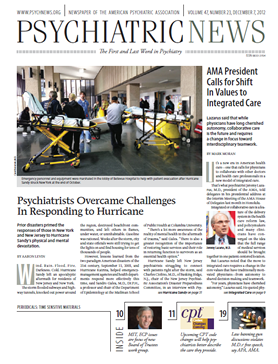When antipsychotic medications are used to treat agitation or psychosis in Alzheimer’s patients, they can worsen cognition and increase the risk of death. But does that mean that they should never be used?
The answer, which wasn’t simple before, appears to have become even more complex now, thanks to a study headed by D.P. Devanand, M.D., and published online October 18 in the New England Journal of Medicine.
Devanand, a professor of clinical psychiatry at Columbia University, and his colleagues found that when antipsychotics are used to treat Alzheimer’s patients for agitation or psychosis and they help, discontinuing them can increase the danger that the symptoms will return.
The researchers studied 180 Alzheimer’s patients at eight medical centers who were experiencing agitation or psychosis. There were several study phases. During the first, all of the subjects received the antipsychotic risperidone (mean dose, 0.97 mg daily) for 16 weeks; 112 of them responded to the medication, of whom 110 underwent randomization. Seventy of the 110 were continued on risperidone for 16 weeks, and 40 were placed on a placebo for 16 weeks.
The rate of relapse was higher in the group that had received a placebo than in the group that received risperidone (60 percent versus 33 percent).
Forty subjects who had received risperidone were then randomized into two groups. Thirteen continued to receive risperidone for 16 weeks, and 27 were switched to a placebo for 16 weeks. The rate of relapse was higher in the group switched from risperidone to placebo than in the group continuing to get risperidone (48 percent versus 15 percent).
“The findings show a significantly increased risk of relapse after antipsychotic discontinuation in patients who respond to the antipsychotic, and this increased risk of worsening in symptoms needs to be weighed against the risk of adverse effects with continued antipsychotic treatment,” Devanand said in a press release.
“This is a well done and important study,” Gary Kennedy, M.D., a professor of psychiatry and director of the Division of Geriatric Psychiatry at Albert Einstein College of Medicine, told Psychiatric News. “Families of patients with Alzheimer’s disease do not ask for anti-psychotic medication until the agitation of their loved one is extreme. Obviously they want to minimize the risk, which means using the medication for as brief a period as possible…. This study gives us much-needed information regarding the risk of relapse once a person who has benefited is withdrawn from the medication.”
The study was funded by the National Institutes of Health and the Department of Veterans Affairs.

